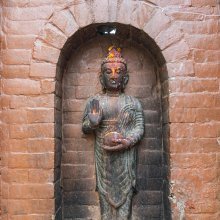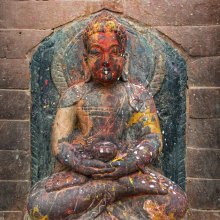Budh: 12 definitions
Introduction:
Budh means something in Hinduism, Sanskrit, Hindi. If you want to know the exact meaning, history, etymology or English translation of this term then check out the descriptions on this page. Add your comment or reference to a book if you want to contribute to this summary article.
Images (photo gallery)
In Hinduism
Kavya (poetry)
Source: OpenEdition books: Vividhatīrthakalpaḥ (Kāvya)Budh (बुध्) in Prakrit is mentioned in the Vividhatīrthakalpa by Jinaprabhasūri (13th century A.D.): an ancient text devoted to various Jaina holy places (tīrthas). Cf. Sanskrit bodhana (horse); -bodhita (Kumāranandin); (Brahmins); -pratibuddha (monks); (thieves); (Piadaṃsaṇā); (Khuḍḍagakumāra); (Samudrapāla); (Jayaghoṣa); (Kuberadatta and Kuberaseṇā); (monks); (Kaṃbala and Saṃbala); (Puṣpacūlā); (Rukmiṇī); -sayaṃbuddha (Kavila); var. -khāmittā (Rāvaṇa); -payahīṇo kao (Iṃdadatta); -utsādita-madana-madaḥ; -cārutarāṃ caraṇa-śriyam aṅgīkāritaḥ (monks); -dikkham (Brahmin Somadeva); -pavvāvia (Pupphacūlā); -pratyekabuddha (Karakaṇḍu); (Dumuha); (Nami); -without particular term (Śrīmātā); (Ambiṇī); (Kapardin).

Kavya (काव्य, kavya) refers to Sanskrit poetry, a popular ancient Indian tradition of literature. There have been many Sanskrit poets over the ages, hailing from ancient India and beyond. This topic includes mahakavya, or ‘epic poetry’ and natya, or ‘dramatic poetry’.
Languages of India and abroad
Sanskrit dictionary
Source: DDSA: The practical Sanskrit-English dictionaryBudh (बुध्).—1 U., Ā. (bodhati-te, budhyate, buddha)
1) To know, understand, comprehend; क्रमादमुं नारद इत्यबोधि सः (kramādamuṃ nārada ityabodhi saḥ) Śiśupālavadha 1. 3;9.24; नाबुद्ध कल्पद्रुमतां विहाय जातं तमात्मन्यसिपत्रवृक्षम् (nābuddha kalpadrumatāṃ vihāya jātaṃ tamātmanyasipatravṛkṣam) R.14.48; यदि बुध्यते हरिशिशुः स्तनंधयः (yadi budhyate hariśiśuḥ stanaṃdhayaḥ) Bv.1.53.
2) To perceive, notice, recognise, mark; हिरण्मयं हंसमबोधि नैषधः (hiraṇmayaṃ haṃsamabodhi naiṣadhaḥ) N.1.117; अपि लङ्घितमध्वानं बुबुधे न बुधोपमः (api laṅghitamadhvānaṃ bubudhe na budhopamaḥ) R.1.47;12.39.
3) To deem, regard, consider, esteem &c.
4) To heed, attend to.
5) To think, reflect.
6) To wake up, awake, rise from sleep; दददपि गिरमन्तर्बुध्यते नो मनुष्यः (dadadapi giramantarbudhyate no manuṣyaḥ) Śiśupālavadha 11.4; ते च प्रापुरुदन्वन्तं बुबुधे चादिपूरुषः (te ca prāpurudanvantaṃ bubudhe cādipūruṣaḥ) R.1.6.
7) To regain consciousness, to come to one's senses; शनैरबोधि सुग्रीवः सोऽलुञ्चीत्कर्णनासिकम् (śanairabodhi sugrīvaḥ so'luñcītkarṇanāsikam) Bhaṭṭikāvya 15.57.
8) To advise, admonish. -Caus. (bodhayati-te)
1) To cause to know, make known, inform, acquaint with.
2) To teach, communicate, impart.
3) To advice, admonish; बोधयन्तं हिताहितम् (bodhayantaṃ hitāhitam) Bk. 8.82; मच्चिता मद्गतप्राणा बोधयन्तः परस्परम् (maccitā madgataprāṇā bodhayantaḥ parasparam) Bhagavadgītā (Bombay) 1.9.
4) To revive, restore to life, bring to senses or consciousness.
5) To remind, put in mind of; स्मरिष्यति त्वां न स बोधितोऽपि सन् (smariṣyati tvāṃ na sa bodhito'pi san) Ś.4.1.
6) To wake up, rouse, excite (fig.); अकाले बोधितो भ्रात्रा (akāle bodhito bhrātrā) R.12.81;5.75.
7) To revive the scent (of a perfume).
8) To cause to expand, open; मधुरया मधुबोधितमाधवी (madhurayā madhubodhitamādhavī) Śiśupālavadha 6.2; सविता बोधयति पङ्कजान्येव (savitā bodhayati paṅkajānyeva) Ś.5.28.
9) To signify, convey, indicate. -Desid. (bubu-bo-dhiṣati-te, bubhutsate) To wish to know &c.
Source: Cologne Digital Sanskrit Dictionaries: Shabda-Sagara Sanskrit-English DictionaryBudh (बुध्).—[(au) aubudha] r. 1st cl. (bodhati) r. 4th cl. (budhyate-ti) also (u, ira) ubudhir r. 1st cl. (bodhati-te) To know, to understand. With prati, to look for, expect. With prati and vi, to wake.
Source: Cologne Digital Sanskrit Dictionaries: Benfey Sanskrit-English DictionaryBudh (बुध्).—i. 1, [Parasmaipada.] [Ātmanepada.], i. 4, [Ātmanepada.] (in epic poetry also [Parasmaipada.], Mahābhārata 1, 5053); originally, To fathom, to penetrate (cf. ved. budh + na, Depth, ground; A. S. bytne, botm; [Latin] fundus). 1. To understand, [Hitopadeśa] i. [distich] 92 (pass.). 2. To know, Mahābhārata 1, 5148 (i. 4). 3. To think, [Hitopadeśa] i. [distich] 3. 4. To perceive, Mahābhārata 3, 2893 (i. 4); [Lassen, Anthologia Sanskritica.] 55, 12 ([Ātmanepada.]); 14 ([Parasmaipada.]). 5. To admonish, [Pañcatantra] i. [distich] 176, (boddhavya, in the sense of bodhayitavya). 6. i. 4, To recover one’s senses, [Bhaṭṭikāvya, (ed. Calc.)] 15, 57. 7. i. 4, To awake, [Rāmāyaṇa] 1, 46, 19; pass., [Pañcatantra] 183, 2; [Śiśupālavadha] 9, 24. Ptcple. of the pf. pass. buddha, 1. Known, understood. 2. Knowing, [Vedāntasāra, (in my Chrestomathy.)] in
— With the prep. anu anu, i. 4, [Ātmanepada.] 1. To learn, Mahābhārata 3, 14779. 2. To know, [Daśakumāracarita] in
— With ava ava, i. 4, [Ātmanepada.] 1. To know, Mahābhārata 2, 1371. 2. To perceive, [Mānavadharmaśāstra] 8, 53. 3. To awake, [Rāmāyaṇa] 2. 72, 50, ed. Ser. [Causal.] To inform, Mahābhārata 1, 5811.
— With samava sam-ava, i. 4, [Ātmanepada.] To know, to perceive, [Rāmāyaṇa] 2, 9, 31.
— With ni ni, i. 1, 1. To learn, [Mānavadharmaśāstra] 1, 119. 2. To hear, Mahābhārata 3, 311. 3. To know, 3, 2443.
— With pra pra, 1. i. 1, To awaken, Mahābhārata 3, 10635. 2. i. 4, To awake, [Hitopadeśa] iii. [distich] 142; [Kathāsaritsāgara, (ed. Brockhaus.)] 3, 65. prabuddha, 1. Wise, [Pañcatantra] 4, 22. 2. Wakened, awakened, [Uttara Rāmacarita, 2. ed. Calc., 1862.] 36, 12; awake, [Hitopadeśa] 14, 7, M. M. 3. Expanded. [Causal.] 1. To cause to know, to inform, to admonish, [Pañcatantra] 121, 10; [Raghuvaṃśa, (ed. Stenzler.)] 3, 68; to instruct, [Hitopadeśa] i. [distich] 53, M. M. 2. To awaken, [Rāmāyaṇa] 2, 56, 1. prabodhita, 1. Instructed. 2. Aroused.
— With vi- pra vi-pra, viprabuddha, Awakened, aroused, [Meghadūta, (ed. Gildemeister.)] 110.
— With prati prati, i. 4, To awake, [Mānavadharmaśāstra] 1, 74. pratibuddha, 1. Known. 2. Wakened, awake. 3. Exalted. [Causal.] 1. To inform, [Raghuvaṃśa, (ed. Stenzler.)] 1, 75. 2. To admonish, to instruct, [Pañcatantra] 87, 24. 3. To charge one with, [Rāmāyaṇa] 2, 52, 35. 4. To awaken, [Śākuntala, (ed. Böhtlingk.)] [distich] 143. pratibodhita, 1. Instructed. 2. Awakened.
— With vi vi, i. 4, To awake, Mahābhārata 2, 162. vibuddha, 1. Awake. 2. Opened (as a flower), [Mālavikāgnimitra, (ed. Tullberg.)] [distich] 60. [Causal.] 1. To awaken. 2. To instruct, [Daśakumāracarita] 181. 17.
— With sam sam, i. 4, 1. To know, Mahābhārata 1, 2498. 2. To be wise, 2, 2187 ([Parasmaipada.]). [Causal.] 1. To cause to agree, [Pañcatantra] 101, 11. 2. To exhort, [Pañcatantra] 84, 1; to admonish, [Pañcatantra] 103, 2. 3. With parasparam, To come to an explanation with each other, [Pañcatantra] 101, 11. 4. To ask, Mahābhārata 1, 3521.
— With pratisam prati-sam, pratisaṃbuddha, Recovered, Mahābhārata 3, 12519.
— Cf. [Latin] puteus (cf. rudhira and bandh), putare; [Gothic.] biudan; [Anglo-Saxon.] beodan, boda, bodian, bodare, and look to the beginning of this article.
Source: Cologne Digital Sanskrit Dictionaries: Cappeller Sanskrit-English DictionaryBudh (बुध्).—bodhati (bodhate), budhyate (ti), [participle] buddha (q.v.) wake, awake ([intransitive], [rarely] [transitive]); watch, notice, heed ([accusative] or [genetive]); perceive, learn, know, understand, regard or know as, take for (2 [accusative]), present with ([accusative] of [person or personal] & [instrumental] of th.). [Causative] bodhayati awaken, revive, restore to consciousness, cause to notice, attend, or understand; remind of, teach (2 [accusative]). [Desiderative] bubhutsate wish to know or learn. [Intensive] bobudhīti have knowledge of ([accusative]).
Source: Cologne Digital Sanskrit Dictionaries: Monier-Williams Sanskrit-English Dictionary1) Budh (बुध्):—1. budh [class] 1. [Ātmanepada] [Parasmaipada] ([Dhātupāṭha xxi, 11]) bodhati, te;—[class] 4. [Ātmanepada] [xxvi, 63] budhyate ([Epic] also [Parasmaipada] ti; [perfect tense] [Parasmaipada] bubodha, [Mahābhārata]; [subjunctive] bubodhati, [Ṛg-veda]; [Ātmanepada] bubudhe, p. bubudhāna, [ib.]; [Aorist] [Parasmaipada] [subjunctive] bodhiṣat, [ib.] ; [imperative] bodhi, [ib.]; [Ātmanepada] 3 [plural] abudhram, ran; p. budhāna, [ib.] [subjunctive] budhanta, [ib.]; abhutsi, [ib.]; Prec. [Ātmanepada] bhutsīṣṭa, [Pāṇini 1-2, 11 [Scholiast or Commentator]]; [future] bhotsyati, te, [Brāhmaṇa] etc.; boddhā [grammar]; [indeclinable participle] buddhvā, [Yājñavalkya; Mahābhārata]; -budhya, [Brāhmaṇa] etc.; [infinitive mood] budhe, [Brāhmaṇa]; budhi, [Ṛg-veda]; boddhum, [Mahābhārata] etc.),
—to wake, wake up, be awake, [Ṛg-veda] etc. etc.;
—to recover consciousness (after a swoon), [Kāvyādarśa; Bhaṭṭi-kāvya] ([Aorist] [Passive voice] abodhi);
—to observe, heed, attend to (with [accusative] or [genitive case]), [Ṛg-veda];
—to perceive, notice, learn, understand, become or be aware of or acquainted with, [Ṛg-veda] etc. etc.;
—to think of id est. present a person (‘with’ [instrumental case]), [Ṛg-veda iv, 15, 7; vii, 21, I];
—to know to be, recognize as (with two [accusative]), [Mahābhārata; Rāmāyaṇa] etc.;
—to deem, consider or regard as (with two [accusative]), [Rāmāyaṇa; Kathāsaritsāgara] :—[Passive voice] budhyate ([Aorist] abodhi), to be awakened or restored to consciousness;—See above:—[Causal] bodhayati, te ([Aorist] abūbudhat; [Passive voice] bodhyate),
—to wake up, arouse, restore to life or consciousness, [Ṛg-veda] etc. etc.;
—to revive the scent (of a perfume), [Varāha-mihira’s Bṛhat-saṃhitā];
—to cause (a flower) to expand, [Kāvya literature];
—to cause to observe or attend, admonish, advise, [Ṛg-veda] etc. etc.;
—to make a person acquainted with, remind or inform of. impart or communicate anything to (with two [accusative]), [Mahābhārata; Kāvya literature] etc.:—[Desiderative] bubhutsati, te ([grammar] also bubodhiṣati, te, and bubudhiṣati, te), to wish to observe, desire to become acquainted with, [Nyāyasūtra; Bhāgavata-purāṇa] :—[Desiderative] of [Causal] See bibodhayiṣu and bubodhayiṣu:—[Intensive] bobudhīti ([grammar] also bobudhyate, boboddhi), to have an insight into, understand thoroughly (with [accusative]), [Subhāṣitāvali]
2) cf. [Zend] bud; [Greek] πυθ for (φυθ) in πυνθάνομαι, πυθέσθαι, [Slavonic or Slavonian] bŭdĕti, bŭdrŭ; [Lithuanian] budéti, budrús; [Gothic] biudan; [German] biotan, bieten; [Anglo-Saxon] béodan; [English] bid.
3) 2. budh mfn. ([nominative case] bhut) awaking (cf. uṣarbudh)
4) intelligent, wise (cf. a-budh).
Source: Cologne Digital Sanskrit Dictionaries: Yates Sanskrit-English DictionaryBudh (बुध्):—(ba, ira, ñaauu) bodhati, te 1. c. (ya, au) budhyati, te 4. c. To know, to understand. With prati to look for, expect; with vi to be wise; with prati and vi to wake.
Source: DDSA: Paia-sadda-mahannavo; a comprehensive Prakrit Hindi dictionary (S)Budh (बुध्) in the Sanskrit language is related to the Prakrit word: Bujjha.
[Sanskrit to German]
Sanskrit, also spelled संस्कृतम् (saṃskṛtam), is an ancient language of India commonly seen as the grandmother of the Indo-European language family (even English!). Closely allied with Prakrit and Pali, Sanskrit is more exhaustive in both grammar and terms and has the most extensive collection of literature in the world, greatly surpassing its sister-languages Greek and Latin.
Hindi dictionary
Source: DDSA: A practical Hindi-English dictionaryBudh in Hindi refers in English to:—(nm) Wednesday; Mercury; (a) wise, intelligent; learned; ~[jana] the wise, prudent people..—budh (बुध) is alternatively transliterated as Budha.
...
Nepali dictionary
Source: unoes: Nepali-English DictionaryBudh is another spelling for बुध [budha].—adj. wise; enlightened; learned; clever;
Nepali is the primary language of the Nepalese people counting almost 20 million native speakers. The country of Nepal is situated in the Himalaya mountain range to the north of India.
See also (Relevant definitions)
Starts with (+83): Budh-keno, Budha, Budha daivajna, Budha-ba, Budhaba, Budhabaje, Budhabrihaspatipuja, Budhabudhi, Budhacara, Budhachara, Budhadarshanacara, Budhadesha, Budhadina, Budhagupta, Budhaja, Budhajana, Budhak-budhak, Budhaka, Budhakaushika, Budhala.
Ends with (+1): Abhinibudh, Abhiprabudh, Abhisambudh, Abhivibudh, Abudh, Anubudh, Avabudh, Nibudh, Prabudh, Pratibudh, Prativibudh, Sabudh, Samavabudh, Sambudh, Samprabudh, Sampratibudh, Samudbudh, Udbudh, Usharbudh, Ushobudh.
Full-text (+458): Budhila, Buddhi, Budha, Sambodha, Pratibuddha, Sambuddhi, Budhya, Bodhana, Samavabodhana, Bodhita, Bubhutsa, Pratibodhin, Pratibodha, Udbodhaka, Vibudh, Budhana, Sambubodhayishu, Bodhin, Avabodha, Vibudha.
Relevant text
Search found 14 books and stories containing Budh; (plurals include: Budhs). You can also click to the full overview containing English textual excerpts. Below are direct links for the most relevant articles:
Vakyapadiya of Bhartrihari (by K. A. Subramania Iyer)
Verse 3.10.3 < [Book 3 - Pada-kāṇḍa (10): Puruṣa-samuddeśa (On Person)]
Maha Prajnaparamita Sastra (by Gelongma Karma Migme Chödrön)
Part 4 - Why is the Buddha called Samyaksaṃbuddha < [Chapter IV - Explanation of the Word Bhagavat]
The Devi Bhagavata Purana (by Swami Vijñanananda)
Mahabharata (English) (by Kisari Mohan Ganguli)
Section XXIX < [Goharana Parva]
Jain Remains of Ancient Bengal (by Shubha Majumder)
Miniature Tīrthaṅkara and Planatary Deities type of Śāntinātha < [Chapter 6 - Iconographic Study of Jaina Sculptural Remains]
Satapatha-brahmana (by Julius Eggeling)
Kāṇḍa VI, adhyāya 8, brāhmaṇa 2 < [Sixth Kāṇḍa]

